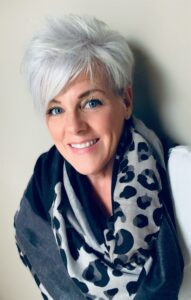Welcome to our Feature Doula series! We are featuring a new doula every 1-2 months, sharing their story of how they came into working in palliative care, what inspires their work, their go-to self care practices as well as any go-to end of life care resources they enjoy.
This March, our Feature Doula is Karen Hendrickson, from Take the Journey, Coaching for Success in Maple Ridge, BC.

What drew you to working as an End of Life Doula?
I was drawn to EOL Doula work because through my coaching practice often there was an underlying loss and/or unresolved grief that I found myself working through with clients - as well my entire life I have experienced many losses, unexpected and tragic, as well as terminal illness and natural causes. People who have experienced or are experiencing loss have always gravitated to me for support and assistance. I have incorporated my EOL Doula work into my coaching practice and refer to myself as Coaching in Life, Death and all the messy in-between. This Doula work is truly simply being a witness to and supporting another through their end of life journey - which in many ways is like coaching - just at end of life or through end of life planning.
What is your philosophy on end of life care?
I believe we all have the right to be honoured and respected at end of life, inclusive of our own individual choices and decisions on the care we receive, where and how we receive it, as well as how we die. I believe death is a natural component of life and when we approach it with grace, love and understanding, we are able to facilitate a much richer experience for both the individual and their loved ones. An experience of honouring, loving compassion, and respect and appreciation for the life lived.
What training and education did you take to become an End of Life Doula?
I took my doula training through Douglas College, as well as having participated in many courses and programs in person and online. I have participated in the End of Life Studies at SFU, as well as have completed training in grief and loss support facilitation, hospice volunteer. My extensive training in communications, coaching, negotiation and mediation has all been beneficial in the work of a doula and supporting those who are facing any challenges or difficulties - including end of life.
What is your go-to self care practice?
My go-to self care practice is solitude. Solitude to simply "be" - whether walking in nature, reading, meditating, journaling and the spa.
What do you love most about your work?
What I love most about my work is how sometimes the simplest of things you can do can make the most significant difference for someone else - whether in a moment, or a lifetime. Through the training and workshops I facilitate it is wonderful to see people experience their "aha" moments, change perspective and embrace the journey of life ... and death. In facilitating ACP plans and delivering workshops, it is wonderful to know you have helped to alleviate confusion, and help them to define what and who truly matter most to them. Once completed, they are relieved and grateful for having done the work.
What is your favourite book on end of life care?
I have a couple: The Four Things That Matter Most by Ira Byock MD, and Talking About Grief Won't Kill You by Dr. Kathy Kortes-Miller - I seem to be sharing these two resources quite often lately.
Do you have a favourite social media account that inspires or informs your business practice?
One of my favourite social accounts is You Might Die Tomorrow (@youmightdietomorrow on Facebook and Instagram) - Kate Manser does an excellent job at helping us to understand the need to embrace our life - and death as one; to live and love fully right now today - because we will die, we just don't know when.
What is your best resource for end of life planning and support?
I don't know there is any one best - there are so many resources available that I have built a library of on and offline resources that grows daily. I tailor my use of resources and support information based on the client. I meet the client where they are. Then through discovery conversation determine what's most appropriate for them and/or their loved ones. You have to be fully aware of the nuances of your client to ensure you are supporting them in ways that make sense for them.
What is your favourite place to volunteer and why?
